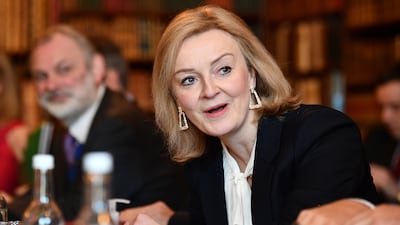Liz Truss, Britain’s Prime Minister-elect, promised on Monday to tackle Britain’s economic woes “in a fiscally responsible way” amid concerns from investors that her tax-cutting plans will worsen the inflation crisis.
Sterling hit a two-and-a-half-year low on Monday and benchmark FTSE 100 futures were down as the Conservative Party prepared to announce the winner of its leadership race, almost universally expected to be Ms Truss.
Kwasi Kwarteng, widely tipped to be chancellor of the exchequer in a Truss Cabinet, sought to reassure markets by saying that Britain could afford the higher spending needed to tackle the cost of living crisis.
“Given the severity of the crisis we face, there will need to be some fiscal loosening to help people through the winter,” Mr Kwarteng wrote in the Financial Times.
“But I want to provide reassurance that this will be done in a fiscally responsible way. Liz is committed to a lean state and, as the immediate shock subsides, we will work to reduce the debt-to-GDP [gross domestic product] ratio over time.”
Policies to deal with inflation became the key dividing line between Ms Truss and her rival Rishi Sunak as the two-month contest to succeed Boris Johnson unfolded.
The new prime minister will take office on Tuesday as British households face an 80 per cent increase in energy bills from October, and the situation is expected to worsen further during the winter.

Ms Truss is promising tax cuts costing about £30 billion ($34.4bn), including the waiver of a green levy and reversal of a national insurance increase passed by Mr Johnson’s government.
She came under fire after saying her priority was tax cuts and not “giving out handouts”, forcing her campaign to clarify that she was not ruling out further direct support during the winter.
But the worsening economic picture, with inflation forecast to reach 18 per cent and a recession expected before the end of the year, raised doubts among investors over whether Ms Truss’s tax plans were affordable.
Paul Johnson, the director of the Institute of Fiscal Studies, told BBC Radio 4’s Today programme that Ms Truss’s plans would require “extremely high borrowing in the short run, but also additional inflationary pressure”.
“She is clearly absolutely right that we have had dreadful growth over the last 15 years,” he said. “The but is that simply cutting taxes, cutting national insurance contributions, for example, is not a strategy for growth.”
Ms Truss promised on Sunday that she would “act immediately” on fuel bills and move to secure energy supplies that were strained by the fallout from Russia’s invasion of Ukraine.
She defended tax cuts projected to benefit the wealthy more than lower earners, saying that “to look at everything through the lens of redistribution … I believe is wrong”.

















